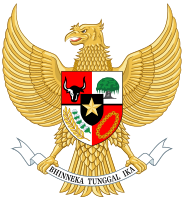First Hatta Cabinet
| First Hatta Cabinet Kabinet Hatta I |
|
|---|---|
|
7th cabinet of Indonesia |
|
| Indonesian Government (Executive Branch) | |
 |
|
| Date formed | 29 January 1948 |
| Date dissolved | 19 December 1948 |
| People and organisations | |
| Head of state | Sukarno |
| Head of government | Mohammad Hatta |
| History | |
| Predecessor | Second Amir Sjarifuddin Cabinet |
| Successor | Sjafruddin Emergency Cabinet |
The First Hatta Cabinet (Indonesian: Kabinet Hatta I), also known as the Presidential Cabinet, was Indonesia's seventh cabinet. It was formed by Vice President Mohammad Hatta, who was instructed to do so by President Sukarno on 23 January 1948, the same day the previous cabinet was declared dissolved. Following the second Dutch military aggression, when the republican capital of Yogyakarta was seized and most of the cabinet arrested, much of the cabinet was captured and sent into exile, although it was not formally disbanded. After the political leadership returned effective 13 July 1949 the cabinet continued its mandate until it was reshuffled on 4 August.
The Second Amir Sjarifuddin Cabinet, under Prime Minister Amir Sjarifuddin, fell on 23 January 1948 following popular outrage over the Renville Agreement, which the populace considered having given away too much of the nascent country's political power.Mohammad Hatta, then serving as vice president, was asked by President Sukarno to form a new cabinet which united the country's political parties. Hatta kept ten members of the previous cabinet, although he did away with the deputy ministers and removed ministers with leftist leanings.
The cabinet was formed on 29 January 1948, with Hatta serving concurrently as vice president and prime minister. It formally took office on 2 February. Its mandate focused on dealing with the Renville agreement, developing the nation, and working towards a consolidated government. With General Sudirman, commander in chief of the military, Hatta worked to reduce leftist influences in the armed forces, which had been exploited during Sjarifuddin's cabinet. However, Hatta's work was greatly weakened by continued division over the Renville Agreement.
...
Wikipedia
